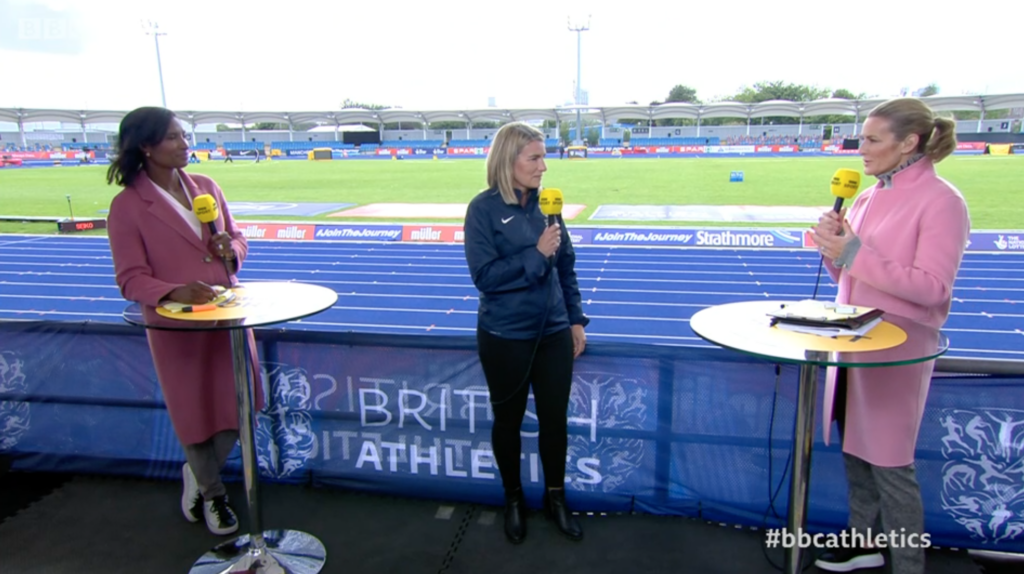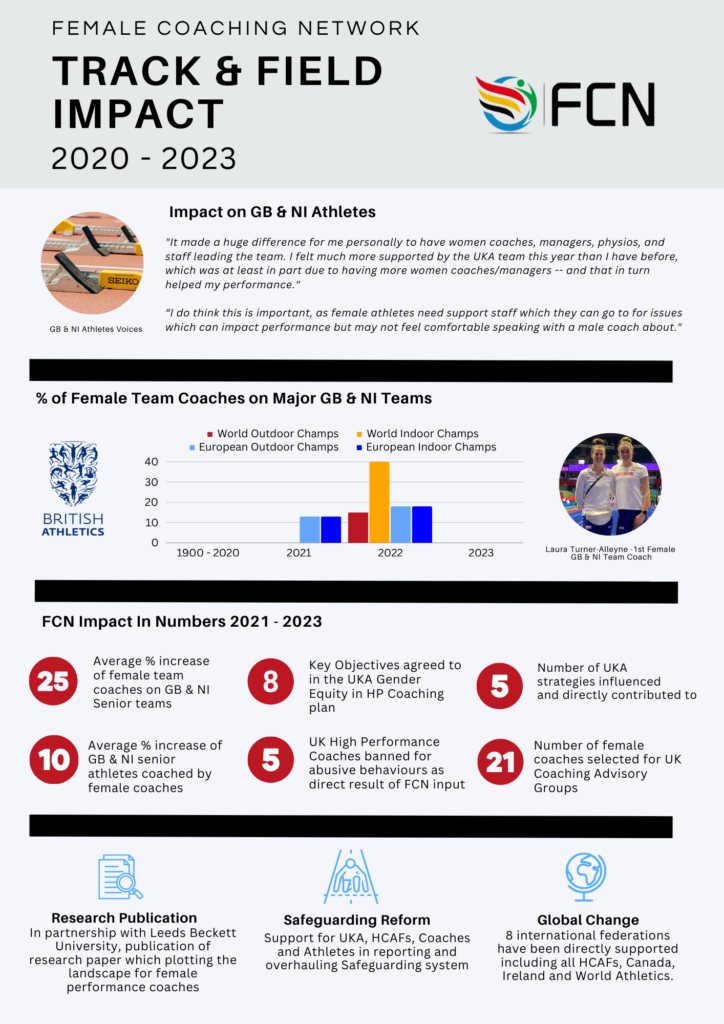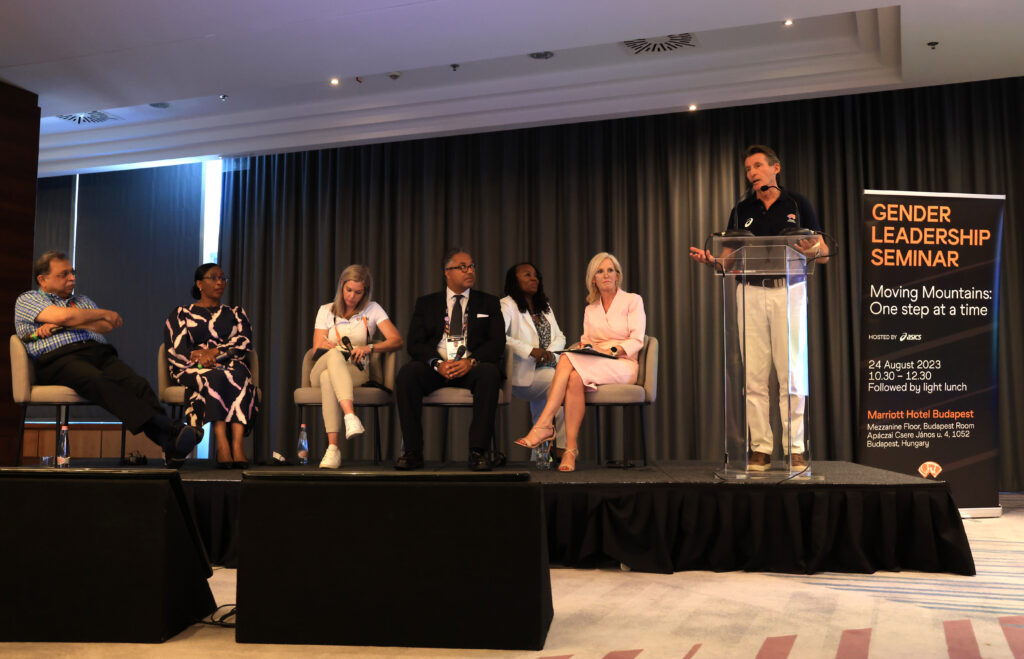
The Female Coaching Network Track & Field: UK is a groundbreaking approach to making much needed change in the world of British track and field.
Pre 2020, the sport was in dire need of highlighting and addressing the many issues and barriers which lead to women’s exclusion in coaching and leadership. The Track & FIELD:UK project aimed to investigate the current landscape, give the coaches and athletes involved an independent voice, and create sustainable changes for the governing bodies to implement.
On mapping the landscape, the following was discovered pre 2020:
- there had never been a female team coach on any GB & NI Olympic, World or European indoor or outdoor team (Olympic Pathway)
- there were a large number of serious safeguarding issues within the elite coaching environment
- female coaches working in a culture in which they were and felt minoritised
- the coaching system in the UK is under-professionalised resulting in poaching, unregulated appointment processes and networks that exclude women
- the NGBs current approach to diversity was seen a s a ‘tick box exercise’
Our Input
The FCN took a collaborative approach to creating change by partnering with Leeds Beckett University and the Centre for Social justice in Sport lead by Professor Leanne Norman. A groundbreaking research project ‘Achieving Gender Equity in High Performance Athletics Coaching in the U.K.‘ was created and was comprised of two stages: 1. a Coach mapping exercise benchmarking the number of female coaches in athletics in the UK. 2. Interviews with female coaches, athletes and NGB representatives.
The paper was published in February 2021 and resulted in a number of findings and recommendations.

On publishing the results, the FCN continued to collaborate with UK Athletics in order to create real change within the sport. The UKA CEO Joanna Coates made a public statement regarding the findings of the paper.
“Firstly, I would like to thank the Female Coaching Network for sharing the findings with me a couple of months ago and also involving me with some of the discussions with the coaches involved in the research, I hope that this proves that we are building trust with groups that previously have felt they were marginalised or excluded by our sport. The insight gathered from the study will definitely help us in creating our new coaching strategy and structure, and we really welcome the amount of work put in by the Female Coaching Network, the Research Centre for Social Justice in Sport & Society and the Carnegie School of Sport at Leeds Beckett University.
Some of the findings of the study I don’t believe are particularly gender specific, it has been clear to me from day one that we need to professionalise coaching, increase the development opportunities and we need to stop this culture of poaching, those are not gender-specific issues.
I also believe this isn’t about needing more programmes that encourage women to be coaches because this isn’t just about increasing numbers. The statistics show we have a sport filled with excellent highly successful female coaches, we need to change the environment in which they operate and improve the experience.
However, the sexual harassment is definitely aimed at women. And similarly to the recent concerns raised around safeguarding, we should completely and utterly have a zero tolerance for anything like this within our sport
But in order to achieve this we need to create a culture where everybody feels safe to come forward and tell us what is going on. Individuals need to know that once they’ve come forward, they’ll be listened to and treated fairly and they’ll be supported through a process which enables us to deal with these people that we do not want in our sport.
I urge anybody, who is currently feeling like they are in a situation that is not right for them to come forward to UK Athletics so we can put those situations right. It is not acceptable, we will make this change and we will have a zero tolerance policy moving forward.”
The following recommendations were made:
Key recommendations
- It is recognised that UK Athletics and the associated home countries are in a period of change. Coupled with the broader and turbulent times (the global health crisis, economic upheaval, the need for inclusive workplaces, digital and technological transformations), now is the right time to address organisational culture. The voices of the athletes and coaches within the research were unanimous too in wanting to see change. But organisations cannot force change merely through technical or strategic approaches (The Centre for Creative Leadership, 2020). The evidence from the research demonstrates that organisational culture is what will determine the level of organisational success. The stories of the coaches and athletes also evidence that work needs to be done to ‘unlearn’ some of the current culture, which is metrics-based and performance-driven, in order to transform. Any strategising by UK Athletics and home country NGBs must consider culture, reward systems, and people, and prioritise equity in the organisation. Any diversity and inclusion strategy must be a central part of organisational strategy rather than an isolated component and one that prioritises care and safety.
- There is a level of awareness within the NGBs as to the current representation within their coaching workforces. Now is the time to move from awareness however, to action. Ensuring fair treatment, representing all identities and differences, and building a culture of belonging are actions are expected by coaches, athletes, participants, and future coaches and athletes too. By not embracing a brand that is synonymous with diversity and inclusion, UK Athletics and the home country NGBs are weakening their ability to attract, retain, and nurture high-potential individuals. For existing coaches and athletes already in the system, the research has shown that this is also coming at a cost to their own wellbeing and sense of belonging in the sport.
- To move away from just an awareness of inequity, to a state of action, organisations must go beyond just recognising biases in the workplace. The NGB representatives demonstrated a degree of willingness to address issues of diversity and inclusion but often did not have the tools or resources to do so. To replace the biases and gendered assumptions within the organisation, tools and actions must be given to people in order to create cultures and teams that are truly equitable, diverse, and inclusive (The Centre for Creative Leadership, 2020).
- One opportunity for change is to acknowledge and celebrate difference in the organisation. This could form the basis of a bold new rebranding exercise through a new marketing strategy. This would help to combat the invisibility of different social groups (such as different groups of women, differing (dis)abilities) within the sport, raise the profile of different individuals across the organisation, and contribute towards redefining who is considered the ‘norm’ when it comes to coaches and leaders.
- The coaches interviewed in the research represent an invaluable resource to UK Athletics and the respective home countries. They are highly motivated, driven, and engaged members of staff. Accessing the full potential of this talent should be a strategic imperative. This research is a crucial first step in identifying the ways in which inequity is experienced by coaches and athletes. Now, the priority should be to set goals, remove barriers, and change practices so that all coaches have a fair chance to the best coach they can be, whoever they are.
- Many of the coaches and athletes’ stories highlighted the problems associated with having an unprofessionalised coaching system. Work is needed towards professionalising coaching (such as renumeration, creating professional associations for coaches, creating a formal pathway and system for selection and progression, creating a formalised system for coach education etc). This would support existing coaches, in particular women, and in turn, their athletes. It would also serve to create a sense of community and collaboration between coaches rather than a competitive and ‘territorial’ culture whereby coaches work in silo. Creating a profession of coaching would also serve to attract future talent by raising the credibility and worth of what it means to be an athletics coach in the UK.
- While it is important to be an athlete-centred organisation, there is a risk that this overshadows the needs and welfare of coaches. Coaches are instrumental to the athletics system and to athlete development. By taking care of our coaches, we are also putting our athletes first. Rather than just a single athlete-centred philosophy, we must take a dual-approach of also being coach-centred. Coaches are not simply vehicles for athlete performance and success. They require similar care and investment, with equal importance placed on their welfare. A change in performance narrative is required by reframing our approach to athlete and coach care, and ultimately, success.
If you would like a copy of the full paper, please email use at info@femalecoachingnetwork.com
Our Impact
Following the publication of the research, the FCN were commissioned to continue working in partnership with UKA to create and develop the ‘UKA Gender Equity in High Performance Coaching”, which was adopted by the UKA Board in March 2022.
Working alongside the UKA Head of Coaching Development Jackie Newton,
“By having critical and constructive eyes out on the ground, we can address any issues and share those findings for the benefit of all. The feedback to us has prompted deep discussion between UKA and the HCAFs. We believe that collective learning will help us all to improve.”
In addition, the FCN created the ‘Women in Athletics Group’, providing female coaches a platform to connect, share and develop as well as providing support to the individual England, Scotland, Wales and Northern Ireland athletics bodies.

Below are some of the big milestones achieved as a result:
- 2021 saw the first female team coach to be selected for a GB & NI European Team
- 2022 saw the first female team coach to be selected for a GB & NI World Championship team
- 2024 saw the first female team coach to be selected for a GB & NI Olympic team
- 5 high performance male coaches banned from the sport for sexual abuse and abusive behaviours
- an overhaul of the UKA Safeguarding practices
Global Impact

As a result of the changes made in the UK, the FCN consulted with a number of athletic federations around the World to advise in how to increase the number of female coaches in performance track and field. Federations included Athletics Canada, Athletics Ireland and World Athletics.
In 2024, the FCN will launch the next phase of their track and field work with the FCN | Track & Field: Reform project aimed at creating systemic and Global change in the sport. This will include launching further research, working in partnership with World Athletics and the founding of the Women’s Athletics Coaching Forum.
For more information, CLICK HERE